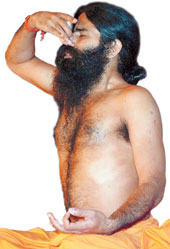 |
| Casting a spell: Swami Ramdev (PTI); a yoga camp at the Divya Yoga Mandir in Hardwar (below) |
 |
Insulation is what seems to set Divya Yoga Mandir apart from other brick-and-mortar dwell-ings in the congested quarters of Kankhal in Hardwar. On a cold January morning, the ashram sees its usual share of visitors. Cars pull over at regular intervals; strains of Bhojpuri mingle with Assamese syllables to generate a continuous hum. Smoke rises from a yajna pyre; a vaidya instructs yoga students: “Repeat this daily for three or four times, and your backache will be cured permanently...”
Swami Ramdev happens to be in Nasik, addressing thousands of Marathi followers who have assembled at his camp there, regardless of the alleged presence of ground human skulls in his Ayurvedic formulations. His earlier camp in Bangalore was a sellout, attended by 7,800 people. And devotees in Surat, Mumbai and Hyderabad have been queuing up for tickets to the camps to be held in their cities soon.
“Swamiji is a busy man, and his only objective in life is to help mankind through yoga,” says Acharya Balkrishan, general secretary of the Divya Yoga Mandir Trust and the one to run the show in the swami’s absence. The acharya handles two mobiles and travels in a Hyundai Terracan, with a machine gun-toting guard for company.
Faith, unlike friendship, takes a single act to be forged, but many blows to be shattered. Clearly, the allegation of adulterating medicines with animal parts, brought against Ramdev by CPM leader Brinda Karat, has had little impact on his devotees, who continue to make a beeline for his ashram. Thursday was a general holiday for Divya Yoga Mandir’s employees ?marking a successful 10 years of its operations. But like the emergency ward of any general hospital, three of the 11 treatment chambers had serpentine queues in front of them.
“I had no option but to depute three vaidyas despite announcing the holiday in advance,” says Balkrishan. “I can’t turn these people away, can I?”
For a man with a humble beginning, Ramdev’s rise to the position of a national icon can only be described as phenomenal. A ‘natural ascetic’, as Balkrishan prefers to call him, Ramdev is believed to have renounced his family as a child to enrol in a gurukul run by Acharya Baldev in Jind, Haryana. He learnt, along with the Vedas and the Upanishads, the science of yoga before beginning to teach in the gurukul. “It was here that I was introduced to him,” recalls Balkrishan who studied in the gurukul under Ramdev.
Soon, Ramdev left the gurukul to head towards Gangotri, with Balkrishan in tow. “We meditated there for several years, before Swamiji felt he should return to do his duty towards mankind,” says Balkrishan. In 1993, the duo came down to Hardwar to take up lodging in the ashram, which was then run by Swami Shankardev. Two years later, Shankardev handed Ramdev the charge of the ashram, thereafter rechristened Divya Yoga Mandir.
“My uncle remembers him walking around on the streets in Hardwar, semi-clothed, distributing pamphlets of his ashram,” says Ramchandra Vashisht, a pharmaceutical student. On a job-hunting spree, Vashisht is currently doing the rounds of all the pharmaceutical plants around town. The doors of Ramdev’s state-of-the-art Divya Pharmacy, located in Hardwar’s industrial area, are closed to him for the moment. “They have put up ‘no vacancy’ signs on the gate. They asked me to come back a month later,” he sighs.
To tackle the growing demand for his medicines, Ramdev commissioned the construction of the pharmaceutical plant two years ago. “Our plant has the capacity to produce about six crore herbal tablets every day,” says an official. “But we are still about four crore tablets short of the demand.”
That, doubtless, indicates the long journey from Ramdev’s mortar-and-pestle days, when he was jostling for space alongside several other yogis and Ayurveda practitioners plying their trade in Hardwar. Somehow, he pipped the others at the post. His fan following ? and that includes Uttaranchal chief minister N.D. Tiwari and President A.P.J. Abdul Kalam ? increased, and television took him to every corner of the country. Overnight, millions of Indians were rubbing their finger nails hoping it would lead to better hair growth.
“No one goes for morning walks in Agartala anymore,” says Deepak Bhattacharjee, a sub-inspector from Tripura, flaunting a rich haul of medicines picked up from the dispensary. “Everyone remains glued to their TVs, following Ramdev’s instructions. I have been following them for the past six months and my problems of high blood pressure and blood sugar seem to have vanished,” he says.
Ramdev’s expertise in the ancient science gave him the early edge over other practitioners in town. As his empire grew, many medics were forced to down shutters and sign up with Divya Yoga Mandir.
“I used to come to a vaidya in Hardwar earlier, to treat my physically-handicapped children,” says Ram Avadh Yadav of Azamgarh, Uttar Pradesh. “The medicines are good here, and my children are showing signs of improvement. Now, if human parts in the medicines are making all the difference, then so be it,” he reasons.
On the highway near Bahdrabad, about 20 km from Hardwar, tourists have already begun to step out of their cars and take pictures of the upcoming Patanjali Yogpith, Ramdev’s multi-crore yoga and Ayurveda project. Membership fees for the new ashram are slated to run into lakhs, but people aren’t complaining. “I hope it will be ready the next time I am here,” muses a devotee.
Expectations, at times, are hard to live up to, but Ramdev seems to be trying hard enough. Give or take a bone or two.

